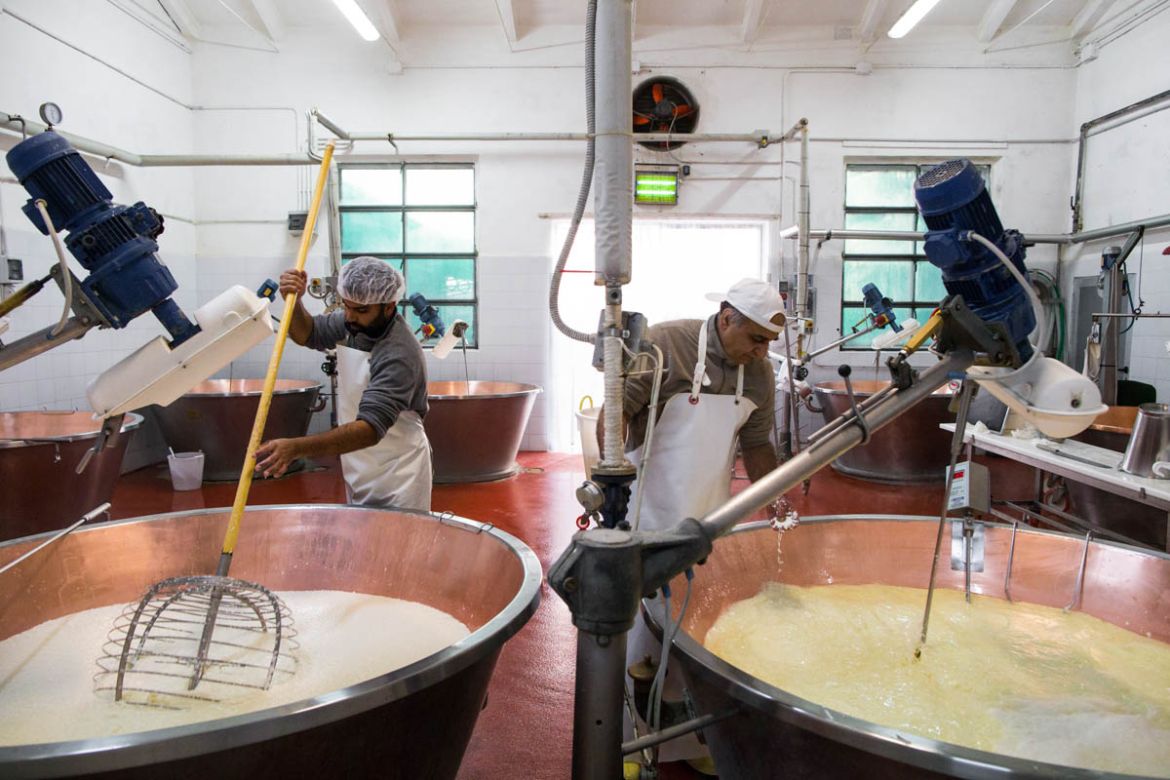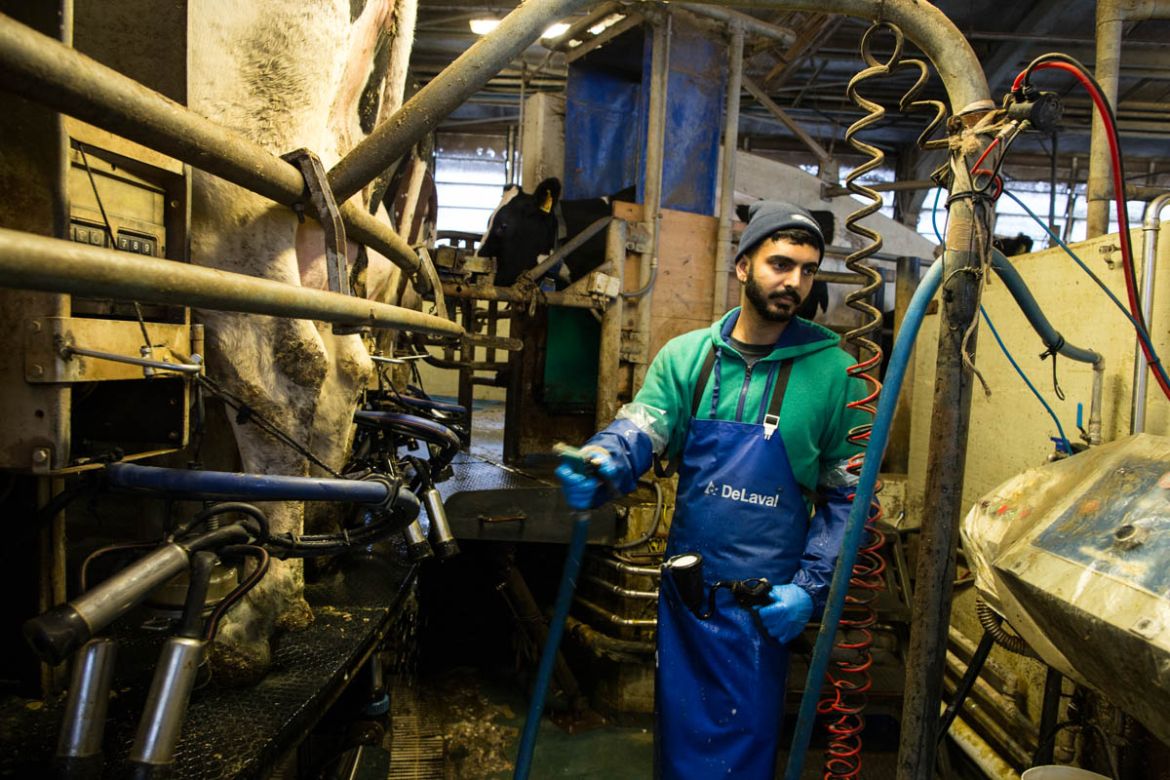In Pictures
The Indians saving Italy’s traditional cheese industry
From Punjab to the Po river: How Indian farmers are adapting to life in Italy and turning their hand to making Parmesan.

It’s 4am in a tiny village in the province of Reggio Emilia and 38-year-old Kloty Jaswantsing is already working hard on the farm. He feeds the cows. He milks the cows. He cleans the cows. Twice a day, every day.
A decade ago, when Jaswantsing imagined his future, he saw himself working as a computer engineer in his native Punjab province in India. But at home, there are more computer engineers than there are jobs.
Others from his village had already made their way to Italy – they said the pristine farms along the Po Valley looked just like home. The difference was that in Italy there was work and the possibility to provide some financial security for his wife and two daughters, now aged eight and 11.
So, eight years ago, Jaswantsing followed the “Sikh Road” to Italy to work in the milk factories. He arrived at the Catellani Gianni Farm in the village of Masone.
At first, the language and culture felt unfamiliar. But Jaswantsing was determined to learn both.
For years, he toiled on the farm while his family remained in India. It was a difficult time. But six months ago, his wife and daughters joined him in Italy. Now, his children attend the local school and Jaswantsing says he feels as though he has finally established a sense of home.
Jaswantsing and his family are part of a growing community from India who now reside in the Parma and Reggio Emilia regions of Italy, aptly named the “Food Valley”. The migration of Indians to the area began in the 1980s and has continued ever since. Now, more than 45,000 of the roughly 170,000 Indians who live in Italy work in 4,000 Food Valley farms and cheese factories.
They work closely with their Italian coworkers and many Italian cheese-makers say they admire the newcomers’ work ethic and their affinity for the livestock. The flat plains with their sweltering summers have become home and the Italian villagers have become their neighbours.
In breaks from work, they play cards together at the village bar and discuss local news stories. During traditional village parties, they celebrate together.
But now, with xenophobia rising across much of Europe, Jaswantsing and his compatriots worry that their close ties to the local community and their years of hard work may be at risk. They read about the wave of populism sweeping through Italy and, although it hasn’t reached their villages, they worry about what might happen if it does.
Still, Jaswantsing says there is a part of him that refuses not to hope for the best and which believes he and his family will primarily be judged on how hard they work.
“We are an honest family and we are [here] to work and to … integrate in[to] this small community,” he says.
The fear of growing racism and xenophobia is just as real for Indians who migrated to Italy decades ago and now have Italian citizenship.
Before he came to Italy, Lal Madan, 57, was a farmer in Punjab. He now works on a farm in the village of Gainago Torrile in Parma province. For decades, he and his wife Kumari Sudesh, 46, have worked 365 days a year as cheese-makers. Their 20-year-old son has followed in their footsteps.
Madan says he is proud to make Parmesan cheese and that it has taken him more than 20 years to learn how. “People eat this cheese in every corner of the planet,” he says proudly.
But working in a small traditional Parmesan cheese factory is not easy. The factory where he works produces 5,000 handmade wheels of Parmesan cheese each year and there is no time for a vacation. But the payoff is that everyone in his family now has an Italian passport.
Madan shares a similar view on the challenges facing Italy as many of his Italian-born neighbours. Taxes, he says, are too high and he worries that the continuing migration to Italy may upset Italians. But what concerns Madan the most is that racism and xenophobia are on the rise not only in Italy but across Europe.
While some like Madan and Jaswantsing are nervous, many newer arrivals say they are willing to risk racism and discrimination if it means a future in Europe.
Sinsh Gursharn, 25, arrived in Italy a year ago. He now lives in Sant Ilario in Reggio Emilia and drives 60km to work his 10-hour shift at a cheese factory seven days a week. While he hears about xenophobia and populism on the local news, he says no news is bad enough to deter him from his objective: for him and his wife to be able to have a baby, buy a house and live their Italian dream.
Across Europe, the far right is on the rise and it has some of the continent’s most diverse communities in its crosshairs.
To the far right, these neighbourhoods are “no-go zones” that challenge their notion of what it means to be European.
To those who live in them, they are Europe. Watch them tell their stories in This is Europe.


![The small traditional Parmesan cheese factory where Madan, Gursharn and Singh work produces 5,000 handmade wheels of Parmesan cheese each year. [Erik Messori/CAPTA/Al Jazeera]](/wp-content/uploads/2018/12/b2df85acd6e244fb8665c937670f42b9_8.jpeg?fit=1170%2C780&quality=80)
![The cheese makers say the job requires great patience as well as a willingness to work long hours. [Erik Messori/CAPTA/Al Jazeera]](/wp-content/uploads/2018/12/d355e1983b104bc29d11841fd1289613_8.jpeg?fit=1170%2C780&quality=80)

![Gurmed Ram, 36, is a herdsman at one of the largest farms in the province of Reggio Emilia. [Erik Messori/CAPTA/Al Jazeera]](/wp-content/uploads/2018/12/8e55d69eb0bf4bd6bb32eb9ff5c35d28_8.jpeg?fit=1170%2C780&quality=80)
![A worker in one of the larger cheese factories in Lesignana in Modena province checks some wheels of Parmesan that have been left to mature. [Erik Messori/CAPTA/Al Jazeera]](/wp-content/uploads/2018/12/a5ace94bc5f741dcaafcea375551eae1_8.jpeg?fit=1170%2C780&quality=80)
![Cheese making is a job that requires great dedication and the Indian cheese makers and their Italian counterparts work 365 days a year. [Erik Messori/CAPTA/Al Jazeera]](/wp-content/uploads/2018/12/d73799dae49245518b6d2deb42f58893_8.jpeg?fit=1170%2C780&quality=80)
![Kloty Jaswantsing, 38, works 11 hours a day in a small farm in the village of Masone in Reggio Emilia province. He is responsible for more than 100 cows. [Erik Messori/CAPTA/Al Jazeera]](/wp-content/uploads/2018/12/b7b262efd7b0417c9a58d1d87760934e_8.jpeg?fit=1170%2C780&quality=80)
![Jaswantsing, left, feeds, milks and cleans the cows twice a day. As the cows must be milked every day, he cannot take a day off. [Erik Messori/CAPTA/Al Jazeera]](/wp-content/uploads/2018/12/1096035a2038470f9dbd82e010156cd4_8.jpeg?fit=1170%2C780&quality=80)

![Kumari Sudesh, 46, prepares to make Parmesan cheese. Her husband, Lal Madan, is also a cheese maker and their 20-year-old son has now followed in their footsteps. [Erik Messori/CAPTA/Al Jazeera]](/wp-content/uploads/2018/12/a1ef650026c84d0e999d8cfbe058f0d1_8.jpeg?fit=1170%2C780&quality=80)
![A herdsman prepares a milking machine for more then 150 cows at Podere Padoa farms in the village of Rubiera in the province of Reggio Emilia. [Erik Messori/CAPTA/Al Jazeera]](/wp-content/uploads/2018/12/a268acdddde84259aee50be8df2e1512_8.jpeg?fit=1170%2C780&quality=80)